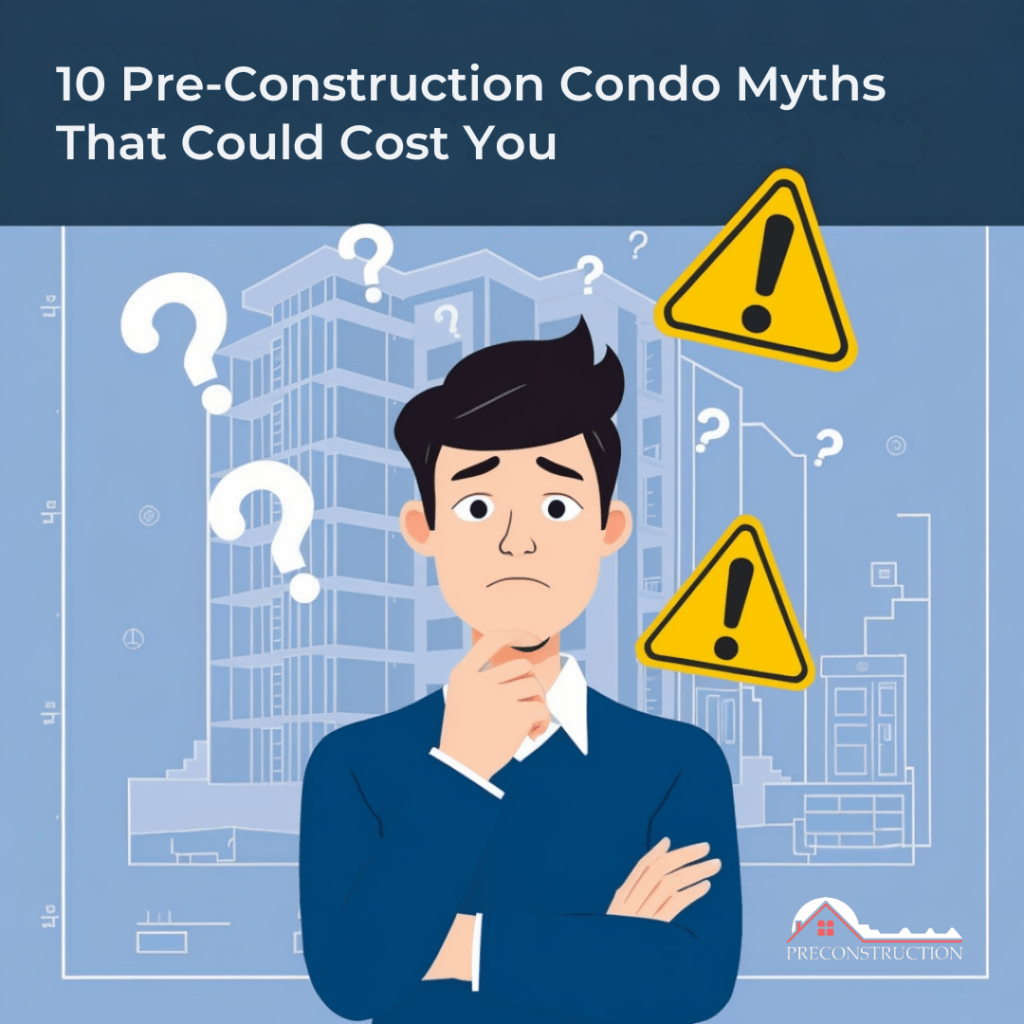Investing in a pre-construction condo can be an exciting opportunity, offering the allure of a brand-new home and the potential for financial gains. However, the pre-construction market is often surrounded by misconceptions that can lead to costly mistakes if not carefully navigated. Whether you’re a first-time buyer or a seasoned investor, understanding the truth behind common pre-construction condo myths is crucial to making informed decisions. In this article, we’ll debunk 10 prevalent myths about pre-construction condos that could impact your investment, helping you approach the market with confidence and clarity.
Understanding Pre-Construction Condo Investments
When it comes to investing in real estate, pre-construction condos present a unique opportunity. These properties are often marketed as a chance to own a brand-new home in a desirable location, with the added benefit of buying at today’s prices for a property that will be completed in the future. But before diving into the market, it’s essential to understand what you’re getting into.
What Are Pre-Construction Condos?
Pre-construction condos are residential units that are sold by a developer before they are fully constructed. Buyers purchase these units based on floor plans, renderings, and other promotional materials, often paying a lower price than they would for a completed home. The appeal lies in the promise of a new, modern living space and the potential for property value appreciation by the time the condo is ready for occupancy.
Why Invest in Pre-Construction Properties?
Investing in pre-construction condos can be lucrative if approached correctly. Buyers often secure a unit at a lower price, with the possibility of the property’s value increasing by the time it is completed. Additionally, these properties usually come with modern amenities and are built in up-and-coming neighborhoods, adding to their attractiveness. However, like any investment, there are risks involved, and it’s important to be well-informed to avoid potential pitfalls.
The Risks and Rewards of Pre-Construction Investments
While the rewards of pre-construction condo investments can be significant, the risks should not be overlooked. Market fluctuations, construction delays, and unexpected costs are just a few of the challenges that buyers may face. Understanding these risks and how to mitigate them is crucial to making a sound investment decision.
Myth 1: Pre-Construction Condos Are Always Cheaper
A common belief is that pre-construction condos are inherently cheaper than resale units. This perception often stems from the idea that buying a property before it’s built means locking in a lower price. While this can sometimes be true, it is not a guaranteed outcome.
The Real Cost of Pre-Construction vs. Resale Condos
Comparing the costs of pre-construction condos to resale properties is more complex than it appears. While the initial price might seem lower, pre-construction condos come with various additional expenses that buyers should consider. These can include development charges, HST (for investors), and other closing costs that might not be immediately apparent.
Hidden Fees and Unexpected Expenses
Hidden fees are a significant factor that can make pre-construction condos more expensive than anticipated. Development levies, occupancy fees, and upgrades can all add up, leading to a final cost that exceeds the original purchase price. Buyers need to thoroughly understand these potential expenses and factor them into their budget.
How to Accurately Compare Costs
To accurately compare the costs between pre-construction and resale condos, buyers should take a holistic view of all associated expenses. This includes the purchase price, potential appreciation, and the various fees that come with pre-construction purchases. Working with a knowledgeable real estate agent can help navigate these complexities.
Myth 2: Prices Will Always Go Up
The belief that property prices will always increase is another myth that can lead to costly mistakes. While real estate has historically appreciated over time, it is not immune to market cycles and downturns.
Market Volatility and Price Fluctuations
Real estate markets are subject to fluctuations based on various factors, including economic conditions, interest rates, and supply and demand dynamics. Assuming that prices will always rise can lead to overconfidence and poor investment decisions. The reality is that the market can experience downturns, and property values may decrease rather than increase.
Understanding the Timing of the Market
Timing is crucial when investing in pre-construction condos. Purchasing at the peak of a market cycle can be risky, as the value of the property may not appreciate as expected, or worse, it may depreciate. Investors must understand the local market trends and economic indicators that could influence property values. This requires careful research and, often, professional guidance to ensure that the investment is made at the right time in the market cycle.
Case Studies of Price Corrections
There have been instances where pre-construction condos, initially expected to increase in value, faced significant price corrections due to market downturns. For example, during the 2008 financial crisis, many real estate markets around the world saw sharp declines in property values. Buyers who had invested in pre-construction condos at peak prices found themselves holding properties worth less than their purchase price upon completion. Such case studies serve as cautionary tales, highlighting the importance of not assuming continuous price appreciation.
Myth 3: You Can Easily Flip Pre-Construction Condos
The notion of flipping pre-construction condos for quick profit is appealing but often misleading. While some investors have successfully flipped properties, the process is far from straightforward and involves significant risks.
The Reality of Flipping in Today’s Market
Flipping pre-construction condos involves buying a unit at an early stage, often during the initial sales phase, and selling it for a profit once the project is completed or nearing completion. However, this strategy is becoming increasingly difficult due to market saturation, rising costs, and competition. Moreover, the timeframe for flipping may extend beyond initial expectations, leading to holding costs that can erode potential profits.
Resale Restrictions and Assignment Clauses
One of the major obstacles to flipping pre-construction condos is the presence of resale restrictions and assignment clauses in the purchase agreement. Developers often include these clauses to prevent speculation and ensure that units are sold to end-users rather than investors looking for a quick profit. These clauses can limit the ability to sell the property before the project is completed, making flipping less feasible. Investors need to carefully review the contract and understand the limitations imposed by the developer before proceeding with this strategy.
Long-Term Investment Strategies
Rather than focusing on flipping, many experts suggest adopting a long-term investment strategy when purchasing pre-construction condos. Holding onto the property for several years can allow for natural market appreciation and reduce the risks associated with short-term market fluctuations. This approach also provides the opportunity to generate rental income, which can offset carrying costs while waiting for the property to appreciate.
Myth 4: Developers Always Deliver on Time
One of the most pervasive myths in the pre-construction market is that developers will always deliver projects on time. While developers strive to meet deadlines, various factors can lead to construction delays, which can significantly impact buyers.
Common Causes of Construction Delays
Several factors can contribute to construction delays, including permit issues, labor shortages, supply chain disruptions, and unexpected weather conditions. These delays can push back the completion date, leaving buyers in limbo and potentially leading to increased costs, such as extended interim occupancy fees.
The Impact of Delays on Your Investment
Delays can have a cascading effect on your investment. For one, they can delay your ability to rent out or occupy the unit, impacting your expected cash flow. Additionally, if the market conditions change unfavorably during the delay, the value of the property might decrease by the time it is finally ready. Buyers should be prepared for the possibility of delays and consider them when planning their investment timelines.
How to Mitigate Risks of Delays
To mitigate the risks associated with construction delays, buyers should thoroughly research the developer’s track record. A developer with a history of completing projects on time is more likely to deliver as promised. Additionally, buyers should ensure that their contract includes clauses that protect them in the event of significant delays, such as the right to cancel the purchase and receive a refund under certain conditions.
Myth 5: You Don’t Need a Real Estate Agent
Another common misconception is that you don’t need a real estate agent when purchasing a pre-construction condo. Some buyers believe they can save money by dealing directly with the developer, but this approach can be risky.
The Value of Professional Guidance
A knowledgeable real estate agent can provide invaluable assistance throughout the pre-construction buying process. They can help you understand the market, identify the best developments, and negotiate favorable terms with the developer. Additionally, agents can provide insights into the reputation of the developer and the quality of their previous projects, helping you make a more informed decision.
Understanding Contracts and Fine Print
Pre-construction contracts are often complex and filled with legal jargon that can be difficult for the average buyer to understand. A real estate agent, particularly one with experience in pre-construction sales, can help you navigate the fine print and ensure that you fully understand the terms of your agreement. This includes understanding your rights and obligations, as well as identifying any potential red flags.
How Agents Can Negotiate on Your Behalf
Real estate agents can also negotiate on your behalf to secure better terms, such as upgrades, incentives, or extended payment plans. Their experience in the market and understanding of common industry practices give them an edge in negotiations, potentially saving you money and securing a better deal.
Myth 6: The Initial Deposit Is All You Need
Many buyers mistakenly believe that the initial deposit is the only financial commitment required when purchasing a pre-construction condo. In reality, the payment structure for these properties is more complex and involves several stages.
Breaking Down the Payment Structure
When purchasing a pre-construction condo, the payment is typically broken down into several installments. The initial deposit is usually a percentage of the purchase price, followed by additional payments at various stages of construction. These installments can add up quickly, and buyers need to be prepared to meet these financial obligations as they arise.
Ongoing Costs During Construction
In addition to the staged payments, buyers may also incur ongoing costs during the construction period. These can include interim occupancy fees, which are charged when you take possession of the unit before the building is officially completed and registered. These fees are often equivalent to the interest on the balance of the purchase price, as well as a portion of maintenance fees and property taxes.
Preparing for Final Closing Expenses
The final closing of a pre-construction condo involves additional costs that can catch buyers off guard if they are not adequately prepared. These can include land transfer taxes, legal fees, development levies, and other closing costs. Buyers should budget for these expenses in advance to avoid financial strain when the final payment is due.
Myth 7: Pre-Approval Means Guaranteed Financing
Securing financing is a critical aspect of purchasing a pre-construction condo, but many buyers mistakenly believe that a mortgage pre-approval guarantees final approval.
The Difference Between Pre-Approval and Final Mortgage Approval
A mortgage pre-approval is a preliminary step that provides an estimate of how much you can borrow based on your financial situation at the time. However, it is not a binding commitment from the lender. Final mortgage approval is only granted once the lender has reviewed the specific property details and your financial situation at the time of closing. Changes in your income, employment status, or credit score can impact your ability to secure financing.
How Changes in Financial Status Can Affect Financing
The lengthy construction period of pre-construction condos means that your financial situation may change between the time of purchase and final closing. If your income decreases, your debt load increases, or your credit score drops, you may have difficulty securing the necessary financing when the time comes. It’s important to maintain a stable financial situation throughout the entire process to ensure that you can obtain final mortgage approval.
Strategies to Secure Financing Throughout the Process
To mitigate the risk of financing issues, buyers should work closely with their mortgage broker or lender throughout the construction period. Regularly updating your financial documents and keeping track of any changes in your financial situation can help ensure a smooth financing process. Additionally, consider securing a rate hold or mortgage commitment from your lender that extends through the anticipated closing date to protect against interest rate increases.
Myth 8: You Can Customize Everything
Many buyers are drawn to pre-construction condos by the promise of personalization. The idea of selecting finishes, layouts, and upgrades to create a space tailored to your tastes is certainly appealing. However, the reality is that customization options are often more limited than buyers expect.
The Limits of Customization in Pre-Construction Projects
While developers may offer a range of finishes and upgrade packages, these options are typically limited to a set selection. The extent of customization depends on the developer and the stage of construction. For example, if you purchase a unit later in the construction phase, your ability to make changes may be significantly reduced. Even when customizations are possible, they often come with additional costs that can quickly add up.
Understanding Standard Finishes vs. Upgrades
Pre-construction condos usually come with a base package of “standard” finishes, which may include basic flooring, countertops, and fixtures. While these options are often adequate, many buyers choose to upgrade to higher-end materials or more desirable design elements. However, it’s important to understand that these upgrades are often marked up by the developer and can significantly increase the overall cost of your condo.
The Impact of Customization on Your Budget
Customizations and upgrades can substantially impact your budget. What starts as a seemingly affordable purchase can escalate as you add features like hardwood floors, granite countertops, or custom cabinetry. Buyers need to carefully consider their budget and prioritize which upgrades are truly necessary. Additionally, it’s wise to get a clear understanding of the costs associated with each customization option before making decisions, as these costs are often non-refundable once agreed upon.
Myth 9: Location Is Less Important for New Developments
A common misconception is that because pre-construction condos are new and modern, their location is less critical. Some buyers believe that as long as the building is new, the value will increase regardless of where it is situated. However, location remains one of the most crucial factors in real estate investment, even for brand-new properties.
The Importance of Location in Real Estate Investments
Location is a fundamental determinant of a property’s value and long-term appreciation potential. Proximity to amenities like public transportation, schools, parks, and shopping centers can significantly influence a condo’s desirability and resale value. A poorly chosen location can limit the property’s appreciation potential, making it harder to sell or rent in the future.
Evaluating Emerging Neighborhoods
While established neighborhoods typically come with higher prices, emerging areas can offer opportunities for greater appreciation. However, investing in an emerging neighborhood requires careful consideration. Buyers should look at factors such as planned infrastructure projects, future developments, and the area’s overall growth potential. It’s also important to consider the risks, as some areas may not develop as anticipated, leading to slower or stagnating property values.
Long-Term Growth Potential and Market Demand
When investing in a pre-construction condo, it’s essential to think long-term. Consider the area’s growth potential over the next five to ten years. Are there signs of increasing demand? Are businesses and amenities moving into the area? The answers to these questions will help you gauge whether the location is likely to appreciate over time or if it may remain stagnant.
Myth 10: The Contract Is Non-Negotiable
Many buyers assume that the contract for a pre-construction condo is set in stone and cannot be negotiated. This belief can lead to missed opportunities to secure better terms or protect your interests.
Commonly Negotiable Terms in Pre-Construction Contracts
While developers often present contracts as non-negotiable, there are usually several aspects that can be negotiated. These may include the payment schedule, closing costs, upgrade options, and even the inclusion of certain appliances or parking spaces. Additionally, buyers can sometimes negotiate caps on closing costs or development charges, which can protect against unexpected financial burdens.
How to Approach Negotiations with Developers
Successfully negotiating with a developer requires a strategic approach. First, conduct thorough research to understand the current market conditions and comparable properties. This knowledge will provide leverage in negotiations. It’s also beneficial to have a real estate agent or lawyer who is experienced in pre-construction sales to guide you through the process and help identify areas where you can push for better terms.
The Role of a Lawyer in Reviewing Contracts
Having a lawyer review your pre-construction contract is crucial. Contracts are often lengthy and filled with complex legal language that can obscure important details. A real estate lawyer will ensure that the contract is fair, that all necessary protections are in place, and that there are no hidden clauses that could be detrimental to your investment. This step is essential for safeguarding your interests and avoiding potential legal issues down the road.
Navigating the Pre-Construction Market
Investing in a pre-construction condo can be a rewarding experience if approached with care and due diligence. Understanding the common myths and misconceptions surrounding pre-construction condos is key to making informed decisions and protecting your investment.
Tips for First-Time Pre-Construction Buyers
For those new to the pre-construction market, it’s important to educate yourself about the process. Start by researching developers, understanding the local market, and setting a realistic budget that includes potential additional costs. Work with a real estate agent who specializes in pre-construction properties, and don’t hesitate to ask questions about anything you don’t understand.
How to Conduct Due Diligence on Developers
Choosing the right developer is one of the most important decisions you’ll make. Investigate the developer’s reputation, previous projects, and financial stability. Look for reviews from past buyers and check whether the developer has a history of delivering projects on time and within budget. This research will help you avoid developers with poor track records, reducing the risk of delays or other issues.
Building a Strong Investment Strategy
A well-thought-out investment strategy is crucial for success in the pre-construction market. Consider your financial goals, whether you’re looking for a long-term investment or a property to live in, and how the purchase fits into your overall financial plan. Diversify your investments if possible, and be prepared for the possibility that the market may not perform as expected. Flexibility and a clear understanding of your objectives will help you navigate the uncertainties of the pre-construction market.
FAQs About Pre-Construction Condo Myths
What should I know before buying a pre-construction condo?
Before buying a pre-construction condo, understand that there are risks involved, including potential delays, market fluctuations, and additional costs. Research the developer, carefully review the contract, and ensure you have a solid financing plan in place. It’s also wise to consult with professionals such as real estate agents and lawyers to guide you through the process.
How do I protect myself from potential risks?
To protect yourself, do thorough research on the developer and the project, understand all terms in the contract, and set aside a contingency fund for unexpected costs. Regularly check in with the developer during the construction process and maintain a stable financial situation to ensure you can secure final financing.
Are pre-construction condos a good investment?
Pre-construction condos can be a good investment if you choose the right project in a strong market. However, they come with risks, such as potential delays and market volatility. The success of your investment depends on careful research, timing, and a clear understanding of the market and your financial goals.
How can I avoid delays in the construction process?
While you can’t completely avoid delays, choosing a reputable developer with a strong track record of on-time delivery can reduce the risk. Ensure that your contract includes provisions for delays, such as compensation or the ability to withdraw if the project is significantly delayed.
What are the key factors to consider when choosing a pre-construction condo?
Key factors include the developer’s reputation, the location of the project, the quality of the construction, the amenities offered, and the overall cost, including any hidden fees or charges. It’s also important to consider your long-term goals and how this investment fits into your financial plan.
Can I negotiate the terms of my pre-construction contract?
Yes, many terms in a pre-construction contract can be negotiated. This includes the payment schedule, upgrades, closing costs, and more. Working with a knowledgeable real estate agent and lawyer can help you identify areas where negotiation is possible and secure more favorable terms.
Conclusion
The pre-construction condo market offers unique opportunities but also comes with its own set of challenges and misconceptions. By understanding the realities behind common myths, buyers can approach the market with greater confidence and make more informed decisions. Thorough research, professional guidance, and a clear investment strategy are essential tools for navigating this complex landscape. With the right preparation, investing in a pre-construction condo can be a rewarding and profitable experience.
Discover the latest trends in luxury Miami condos at Brickell Sold, and explore professional real estate photography services in Toronto with Click Media Pro. For comprehensive updates on Canadian real estate developments, visit Wedu and the Wedu Blog. Stay informed about the pre-construction market by visiting Preconstruction Info.







